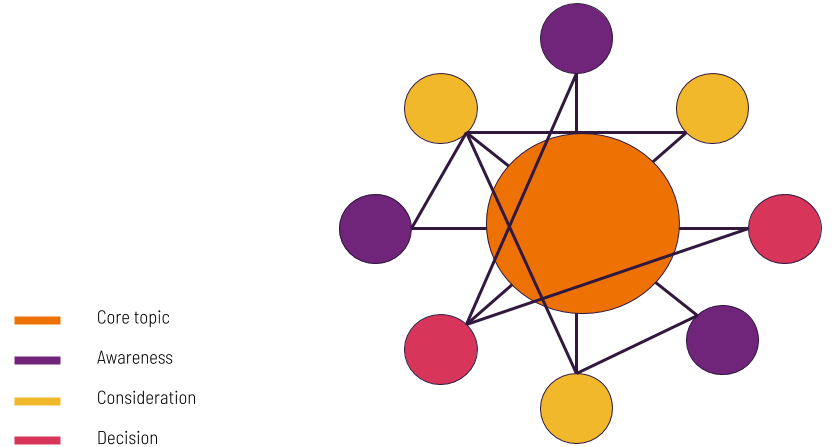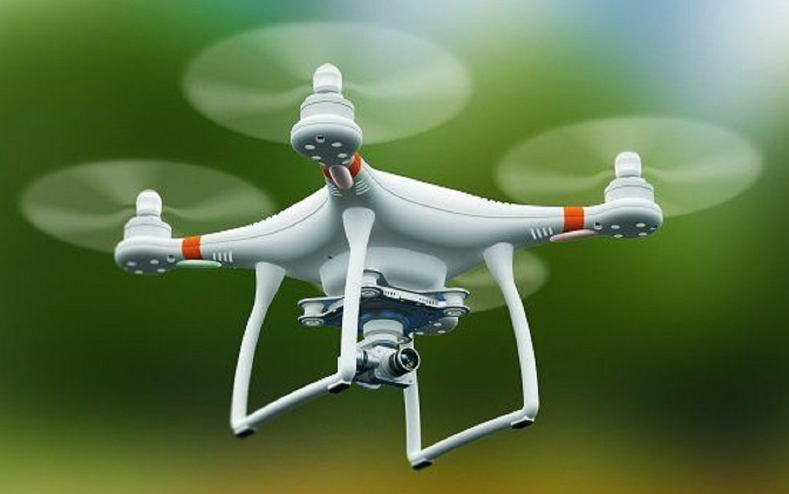COVID-19 is the biggest modern plot twist of our time and is presenting many different challenges for all small and medium-sized businesses.
At Metigy, we are building the world’s leading community of Forward Thinking SME Marketers and we want to give you the best advice from the best in the business to support your marketing efforts that will ultimately support your business through these uncertain times.
We’ve asked some of the world’s best marketers for their advice and what they’re actually doing in their own business, to guide you through these uncertain times.
Jon Dawson
FOUNDER AND HEAD NINJA
As a business, what’s the most important thing to keep focused on during this time?
Your team, much like everybody, they’re likely to be undergoing significant changes to the way they’re used to working – also the new challenges and uncertainty people are experiencing can result in heightened anxiety. By staying connected to your team you can help them tackle any frustrations and ensure that client service isn’t negatively impacted. We use tools such as Zoom and Slack to keep connected.
What’s the first thing you would do in rethinking your marketing strategy?
I wouldn’t completely rethink the marketing strategy, rather I’d try to understand whether a segment of your target audience is more likely to be negatively impacted by what’s going on. Then look for ways to either:
- Pivot away from targeting these groups if we’re 100% sure they’re not valuable prospects for your business
Or - Look for ways to adjust your proposition and/or distribution channels to suit the current climate – for example, lots of restaurants and coffee shops are now offering takeaway options.
What if my business or industry has had to cease trading for now – what should my communication/marketing strategy be and/or should I just turn everything off?
Ideally, if you have some kind of residual funding you should try and keep some “general information” style campaigns live that tell your customers that you’re on pause and haven’t ceased trading. If you’re paying somebody to run your digital campaigns for you, hopefully they’ll be able to take a payment pause or reduction on their fees, freeing up more budget for your marketing efforts. Some of the businesses I work with have negotiated up to a 65% reduction in expenses just by calling their suppliers and letting them know the situation. Suppliers don’t want your business to fail, and most have been happy to help in these troubling times. An example is Google, who are offering certain small businesses ad credits to help them through this crisis. My clients have also seen the average price of Google Ads drop by 30-50%. There has never been a better time to start your first Google Ads campaign. It’s still the best way to get in front of the customers who are looking for your services and products.
Related: Start your first Google Ads campaign with Metigy
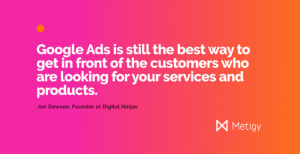
Aleksandra Wocial
STRATEGIC PARTNER MANAGER
As a business, what’s the most important thing to keep focused on during this time?
I believe that as a business you first need to understand how this current situation is affecting you and your clients. At Google, we work with all sorts of businesses across many different verticals and what we’ve noticed is that while some businesses are trying to stay afloat, the others are seeing increased demand from their clients. Every business is different but each of them should ask themselves questions like: How is my business affected by this global pandemic? How am I adapting to the new reality? What behaviors and expectations do my customers have right now?
The steps we recommend businesses to take today include:
- Keep your customers informed – Regularly update communications across your website, blogs, social handles as well as your Google My Business page to ensure people are in the know.
- Continue to adapt to new customer behaviour – Google Trends is a fantastic tool where businesses can find insights on how to navigate this new environment and understand what your customers need.
- Run your business remotely – there are many digital tools available to help you and your team stay connected and productive from afar.
- Adjust your advertising – As this situation evolves and customer behaviour changes, online advertising is one way to keep your current and potential customers up to date.
What’s the first thing you would do in rethinking your marketing strategy?
The first thing I would recommend every marketer to do is to understand how their customer’s behavior has changed and how they can stay helpful in this dynamic environment.
To keep up with shifting behaviors, we encourage marketers to consider Google Trends, a free tool that provides access to actual search requests across Google Search, YouTube, Shopping, and Images. By entering a keyword or a topic, you can explore what the world is searching for in near real-time and based on this information you can start thinking how you can adapt your marketing message.
It was very interesting for me to see the insights from Kantar’s COVID-19 Barometer that show that consumers don’t think brands should stop advertising during the coronavirus pandemic. 77% of them say brands should talk about how the brand is helpful in the new everyday life. My main takeaway from this study is that marketers should be thinking how to connect with clients and that a clear majority of consumers expect advertising to make a positive contribution to society.
Mobile, social and digital has never been more important – if this isn’t their strong point, what are your suggestions to get the ball rolling?
It’s incredible to see how quickly some of the companies adopted to this new reality and transitioned their businesses online. Digital presence has become more important than ever and I believe the shift towards digital will be a lasting one.
If you’re a business that’s starting its digital journey now, I’d encourage you to think if you can shift some of your products or services online. Start by thinking about what value you offer your customers. Are there ways for you to offer that value in a different format or online channel? For example:
- A retailer with a brick and mortar shop might sell products online
- A restaurant might offer online ordering for pickup and delivery
- A personal trainer might begin virtual training sessions for clients
If you do not have a website for your business, start by getting a domain and exploring options for building a website. Your website can be simple – just make sure you include key information about your business and how potential customers can contact you.
You can also consider starting a free YouTube channel for your business. You can create videos to introduce your business, showcase what’s great about your products or services or teach customers how to do something new.
Related: The Simple Guide to Creating Your First Engaging Video for Digital Marketing
You can also start advertising online by using Google Ads. You can show the world what’s unique about your business and reach customers searching for what you offer. Google Ads has built-in automated solutions that will help optimise your ad campaigns to show the right message to the right user, at the right time.

Related: Start your first Google Ads campaign with Metigy
What content are people looking for at this time?
With so many people spending more time at home these days, media consumption is up around the world1. Recent survey data suggests that YouTube is among the platforms that are experiencing the highest uptick in activity2. From what I’ve seen, the most popular videos on YouTube now are related to fitness, yoga, gardening, cooking and homeschooling. Since we’ve been practising social distancing, we’ve seen a rise in “with me” videos, where people film themselves going about ordinary tasks like cooking, cleaning, or shopping, and Aussie YouTube creators are inviting audiences to join them by creating content like “cook with me” or “workout with me.”
Searches for DIY have spiked globally in the past few months, with Australia and New Zealand among the top 10 countries showing increased interest. In fact, 52% of Aussies believe self-isolating will let them try new things, and 48% believe it will help them rediscover their passions.3 It’s also worth mentioning that search interest related to retail has spiked globally over the past few months as people try to find things they need.4
1.NIELSEN 2. NRG CORONAVIRUS STUDY, SURVEY CONDUCTED 3/25/20, N=505 / 3. THE LAB/NATURE, COVID-19 BRAND NAVIGATOR STATE OF THE NATION REPORT, APRIL 2020, N=1000 AUSTRALIANS 16+ / 4. GOOGLE TRENDS, PAST 90 DAYS, ENDING MARCH 31, 2020, WORLDWIDE.
What’s the one tip you would leave people with?
I’d like to finish by saying that eventually this difficult time will pass and once we’re able to get back to our “normal life” again, I’d encourage all of us to think what we’ve learnt and what are some of the innovations and new ideas we’ve seen that we can incorporate into our lives. In the meantime I wish all of us to stay safe and healthy!
Daren Lake
FOUNDER AND HEAD OF CONTENT
Pod Paste
As a business, what’s the most important thing to keep focused on during this time?
As a media production company and creative agency, the single most important thing for us is our team. Then closely followed by our clients. Without either we are nothing.
I’ve taken special care to talk with our team and see how they are doing during this time and trying to make things easier for them while maintaining a steady workload and keeping them occupied.
With our clients, we are focusing on current campaigns and future campaigns. We are also looking to do more COVID-19 focused content while retaining an evergreen core, which can be tough.
What’s the first thing you would do in rethinking your marketing strategy?
The first thing I would do is look at who needs help. I’d figure out if they have the resources to pay for it, or if we can help them pro-bono. Value isn’t just financial, it can also be doing the right thing at the right time for people in need.
For example, since my podcast studio was closed due to COVID-19, many of my clients were forced to record audio at home. To help them and others that were struggling, I created a detailed tutorial on how to make your home audio recordings sound better.
This obviously looks good in the long term, but you shouldn’t do it to look good. You should do it because you want to actually help someone. Altruism in its essence.
Related: Share with Oscar are using Metigy to help healthworkers during COVID-19
What if my business or industry has had to cease trading for now – what should my communication/marketing strategy be and/or should I just turn everything off?
Pivoting off of the last answer, if the business had to cease trading, the best thing would be to keep a conversation going. Talking authentically without getting anything in return on social media, LinkedIn, emails, even text and the phone if you have those relationships.
Telling stories as most marketers know is key, and looking to create a genuine two-way conversation with our network would be the main focus.
Mobile, social and digital has never been more important – if this isn’t their strong point, what are your suggestions to get the ball rolling?
If mobile, social, and digital isn’t a strong point for a business, I’d suggest just telling stories and sharing ideas. Even look to content curate (sharing of similar people/brand’s content) if you don’t have anything to say or are figuring out your “voice” and “digital tone”.
What content are people looking for at this time?
I don’t know what everyone is looking at, but this article breaks down a lot of generations, demographic and exactly what they are consuming.
I personally am doing 60% learning more about podcasting and marketing, 30% fitness/health (my fun stuff), and 10% about COVID-19/the economic future. What I’m not consuming and looking at are any conspiracy theories that have zero evidence or science behind them.
It’s a good time for a business health check. What’s the most important thing you recommend? (SEO, Google business listings, going deep with your data?)
Whatever has worked for you that you can’t do now, think asymmetrically and see what happens. If organic reach, word of mouth and networking worked for you because you attended events, think about where all of those people are now online.
Forget strategy for a second, how much should content at this point acknowledge COVID-19 and how much should comms be business as usual?
This is super subjective. I think you should attempt to keep your content on brand, with a hint of being aware of the situation. I personally get numb when everyone is talking about the same stuff and no one has solutions. It’s just talk for the sake of talking. Similar to how we talk about the weather. We all have it in common but it’s serving no value to anyone. But I’m also special, ha. This article explains what you should do from a podcast point of view.
Related: The best COVID-19 marketing campaigns that will inspire your business
If you only had $100 to spend on paid advertising, where would you put it?
This depends on your target demographic. I would spend it wherever your clients/customers are hanging out. B2B Millennial/Gen-X would be LinkedIn (great value for your dollar). Gen-Z would be TikTok.
What’s the one tip you would leave people with?
This is a normal cycle of humans. Pandemics and global catastrophes have been happening for thousands of years. We usually grow from these and end up more resilient and stronger. It might happen in a few months, years or decades but it will happen again. Also, be aware of how you feel now and then take inventory of how you feel 3-6 months out. I would also recommend reading this article for further wisdom on this.
I also did a podcast on a bit of what I spoke of in these answers. You can listen here.
Nathalie Rafeh
MENTOR AND GROWTH MARKETER
As a business, what’s the most important thing to keep focused on during this time?
I think the most important thing for every business is to take a step back, keep a realistic picture, and map out/evaluate the impact on a standalone personal basis as it strongly varies from industry to industry. Go into problem solving/ anticipation instead of solution mode initially. Assess the impact that COVID-19 has on your organisation for the short, mid, and long term in terms of cash flows, employees, products/services’ positioning & relevance in this environment. Some companies heavily invested in R&D or pivoted in previous crises, which proved to be successful in sustaining and thriving.
Prepare for the aftermath as business won’t go back to normal when lockdown is lifted. Take China for example where Cinemas closed a week after reopening and low consumer spending is persisting even when the population is going back to work.
Sometimes you just need to accept that this is going to be a tough period for most businesses. If you look at previous crises such as the GFC in 2008, you can see expenditure reduction mostly in the electronics, retail, dining out, and home improvement categories as discretionary income decreased.
Interestingly, we are seeing some businesses completely change their value offering. Fratelli Fresh (the Italian restaurant chain) pivoted from restaurants to selling groceries and DIY meal packs online.
The good thing is the business community has really been impressively coming together during this tough phase. I encourage founders, owners, and employees, to engage with others, ask questions, double down on education through attending webinars, workshops as new regulation unfolds, speak with your accountant and lawyer, and try sustaining the team’s motivation.
This crisis will pass. When this is all over, many people will be seeking to travel, get married, and resume normal life as we know it.
What’s the first thing you would do in rethinking your marketing strategy?
From a strategic point of view on the customer comms side, it is worthwhile for brands to provide information on the policies they are rolling or the measures they are taking amidst the pandemic. Critical content, events, or launches may be best to be pushed out for later in the year or when things quiet down.
From a marketing perspective, an organic traffic decrease is occurring in almost every industry. Conversion rates are also down (except for groceries shopping/similar unimpacted industries). Interestingly, the cost per click isn’t dropping down as advertising costs haven’t been impacted by much yet, thus bringing the cost per customer acquisition up. On the bright side, it is not all gloomy as many businesses are spending less, meaning this can bring in more visibility and results for you.
Interestingly, some people may be seeking inspirational content as our feeds are flooded with COVID-19 information and news. Some brands are engaging with their customers through educational or inspiring content as plenty of people now are invested in education and knowledge and have more time to pursue them. Perhaps sharing creative content that keeps people away from thinking about the daily pandemic can create you truly engage with your audience. Check what’s trending on Google Trends for your industry, see what keywords are trending, and engage with your audience on this trending area for example.
Positively, this will help with your SEO. Another quick win in the SEO area can be updating your Google store opening hours.
Funnily enough, I read an article that discussed the different do’s and don’ts during this pandemic, which included using fewer visuals of crowds, avoiding the use of ‘get in touch’. I am not too sure what to think of it but experiment away!
If you only had $100 to spend on paid advertising, where would you put it?
I would still be asking the same question if I had $1 or $1000 to spend on advertising: what am I doing this for and what do I hope to achieve? Sometimes the question should be should I spend the money rather than where. This all ties down to your strategy with no size fits all.
Exploiting the situation might hinder your perception by others. Put yourself in your customer’s shoes and really think through how their lives have been impacted then think of how your brand can help them in this phase.

Mobile, social and digital has never been more important – if this isn’t their strong point, what are your suggestions to get the ball rolling?
Customers going local, going small, is definitely a possibility that small and offline businesses can leverage at this point. I’ve seen a few businesses rely on offline messaging by placing signs or flyers on doors offering their services if their local neighbourhood requires anything.
Ho Jun Tang
CO-FOUNDER AND HEAD OF MARKETING
As a business, what’s the most important thing to keep focused on during this time?
Customers are your Number One, your north star. It is critical to keep iterating and continuing to service your customers, finding new ways to provide support and value to your customers. It’s a perfect time, when the chips are down, to show your customers that you are still there to service them and are willing to do that in any way shape or form.
What’s the first thing you would do in rethinking your marketing strategy?
There are two key aspects that need to be adjusted within your marketing strategy. First of all, the tone of marketing needs to be different, it needs to be sincere and empathetic to what your audience may be going through. The state of mind of your audience has changed, and therefore your message should also. Secondly are the needs and wants of your customers. What do your customers value more during a time like this? Is it Safety? Entertainment? Connection?
What if my business or industry has had to cease trading for now – what should my communication/marketing strategy be and/or should I just turn everything off?
With great change comes great opportunity to serve changing customer needs. This is the time to create more value than ever for your customer base, e.g. Gyms providing at-home-exercise content, food & beverage developing their digital capabilities for online ordering and delivery.

At Yellowbox, our convenient smart-lockers are normally used for short-term storage purposes. Although now we are providing contactless Pick-Up and collection smart-lockers to businesses. Thus allowing customers to pick up deliveries from any Yellowbox without any human contact and greater flexibility.
Mobile, social and digital has never been more important – if this isn’t their strong point, what are your suggestions to get the ball rolling?
Your website and channels have now become a virtual storefront. There are several free to use website builders, and social channels that allow for free business accounts which provide statistics on the success of your engagements. It is a fantastic time to invest in interacting with your customers on different platforms.
What content are people looking for at this time?
In accordance to Maslows’ hierarchy of needs, people are looking to be safe first and foremost and meet their physiological needs, whether that is getting necessities, reducing risk to health or being able to pay rent.
Thus, consumers need to be informed, people need to know what is going on, how your business is operating and whether they are still able to receive your services (otherwise they will assume they can’t).
Once people have survived the ‘shock’ phase, and have met their most basic needs, many seek entertainment, e.g. ideas and ways to make the most of the time available. This can be activities to advance their own personal development, or games to enjoy with family and friends.
It’s a good time for a business health check. What’s the most important thing you recommend? (SEO, Google business listings, going deep with your data?)
It is a fantastic time to assess the operational costs of your business, as these are the costs that aren’t directly tied to generating revenue. It’s clear that now is a critical time to assess the business’ online capabilities and virtual service delivery. It is the perfect time to have your online presence as the centre of your marketing strategy and invest time into your most effective mediums.
At Yellowbox, we are looking closely at our outgoing costs and how closely they tie to directly generating revenue. We’ve definitely been challenged to de-risk our business model.
Forget strategy for a second, how much should content at this point acknowledge COVID-19 and how much should comms be business as usual?
First and foremost, your customers need to be informed of how your business operations have been affected by COVID-19, whether you are still operating virtually, are in hibernation, are developing new products or business as usual!
In terms of content, I believe the general message tone of the business needs to be mindful and sincere, reflecting a change in the mindframe and general activities of your audience. Other than that, your content needs to continue to be true to your brand strategy (that means not delving into health topics if you have never done so previously) and persona.
What’s the one tip you would leave people with?
COVID-19 has certainly brought a spanner into the works in terms of how we live our lives both locally and globally. But if the goings are tough for your business, then it is likely the same for your competitors, which means on a level playing field, comes opportunity to be stronger on the other side. Take advantage of this period, and generate excitement from the opportunity within the market and potential market. The most agile businesses will be the ones that come out on top.
Jane Qiu
CO-FOUNDER
What if my business or industry has had to cease trading for now – what should my communication/marketing strategy be and/or should I just turn everything off?
For businesses that have had to cease trading, there should be clear communication to their customers and express gratitude as well as try your best to complete the remaining after-sales service.
What content are people looking for at this time?
Digital marketing and health and nutrition. A lot of traditional businesses are moving their communication online and need the support of advisors in digital marketing and PR. The easiest way to find a digital marketing advisor/mentor is on Kintell. Our platform provides one-to-one video advice and tuition with an expert on any topic. This allows users to quickly learn new skills that are tailored to their needs to run an operation digitally.
Forget strategy for a second, how much should content at this point acknowledge COVID-19 and how much should comms be business as usual?
We should acknowledge this is a special situation but also try to deliver “positive energy” instead of adding to the fear, which doesn’t help. It is unrealistic to pretend business as usual because everyone is thinking about the same thing when they open their eyes in the morning. Therefore, it is the best opportunity for all communicators to practise empathy and genuine care for those who are reading their post or article. It is much more helpful to focus on acknowledging people’s pain points because of the current situation and let them know you are trying to be part of the solution, while delivering constructive and positive thoughts in this challenging situation. For example, I have seen some businesses choosing an image of the virus to go with their post which is a bit overwhelming and unsettling (I mean, by now everyone knows what the virus looks like!). Unless that image informs what you are trying to communicate, it is unnecessary. To summarise, the keywords are: empathy, solution, positive energy.
If you only had $100 to spend on paid advertising, where would you put it?
Offer it as 10 x $10 discount to customers. Sponsor your customers directly.
What’s the one tip you would leave people with?
Never get too comfortable during normal times, always keep learning new things and improving yourself as a business operator, and get prepared for the unknown. This is not the first time we have run into something like this and will not be the last.
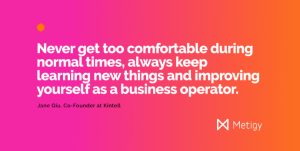
Shahe Momdjian
FOUNDER & CONTENT MARKETING STRATEGIST
As a business, what’s the most important thing to keep focused on during this time?
The accountants would say cash flow (and they would be right), but I’ll go with relationships.
Keep in touch with existing clients: let them know you’re OK and if you’ve made any material changes to the business or service. Even if some of those changes are difficult, if the upshot is that you’re now financially sustainable, that’s a good message. In their heads, the small box you occupy will be marked ‘stable,’ and the more stability you can give your clients right now the better. More importantly, find out how they’re doing! Are they doing well? Be there to help them ramp up and meet the increased demand. Are they struggling or even hibernating? Keep in touch with them too, they will need you again soon! Build relationships like never before. They will appreciate the check-in but you have to get the tone right – it’s not another “sell” – it’s a genuine check-in from someone (you) who cares.
Keep in touch with prospects: let them know if the proposal is impacted (especially if the deal is being sweetened for them). They need to know that you’re going to be around and that you still want their business.
Keep in touch with everyone else: whether or not they’ll turn into leads, your online followers want to hear from you and may be concerned about your whereabouts if they don’t. Now is not the time to drop the ball on business-as-usual marketing activity; your priority may not be growth right now, but marketing is as much about communication and continuity as it is about growth.
What’s the first thing you would do in rethinking your marketing strategy?
Breathe. Look at the business as a whole. Are you really affected? How affected are you? The answer to that depends on the nature of your business. Selling online programs, homewares, yoga mats and wine subscriptions? Happy days! (Don’t just now get into these businesses – you don’t want to be seen to be profiteering!) If they’re not happy days, if the days are in fact truly grim, then consider some more dramatic moves for your business and marketing strategy. Have sympathy for all the hurting businesses and business owners out there and listen to them, but don’t automatically internalise their suffering – it seems some people are operating under the assumption that they’ve been badly impacted when they haven’t!
What if my business or industry has had to cease trading for now – what should my communication/marketing strategy be and/or should I just turn everything off?
No – maintain your communication!
You’ll need those relationships when business does pick up again and, if anything, you’ve probably got more time than ever to craft some beautiful messages for them!
Mobile, social and digital has never been more important – if this isn’t their strong point, what are your suggestions to get the ball rolling?
Don’t rush.
Take this time to explore what might work for you.
Like to be on camera? How about some video content? Good off the cuff? Livestream. Need to prepare? Pre-recorded. Don’t want to be on camera? Podcasts. Hate your voice? Screen capture videos with a professional voiceover artist. Nice way of keeping a struggling creative employed too!
What content are people looking for at this time?
REAL news from you, what’s actually happening behind the scenes. Are you struggling? Are you optimistic? Share frankly but use the right channels. Outpourings of the heart should come from personal emails, blogs and social posts (e.g. on your own LinkedIn profile), not as “posted by admin” posts on the website. You want engagement and possibly genuine sympathy/support. As a startup/SME, you can only really get that as yourself, not as a brand.
Good news stories!
It’s a good time for a business health check. What’s the most important thing you recommend? (SEO, Google business listings, going deep with your data?)
Updating and making sure all your company information is up to date across all channels. Google listing, social media, website. How about all the employee bios you’ve been meaning to put on the website? Checking that they’ve all linked to the company on LinkedIn? How about starting that blogging habit you’ve been meaning to?
Forget strategy for a second, how much should content at this point acknowledge COVID-19 and how much should comms be business as usual?
Mention it to look relevant, tuned in and sympathetic. You can focus on some of the good news if it’s all feeling too macabre e.g. Australia’s excellent slowdown in the daily growth rate. Don’t dwell on it. They’re getting enough of that elsewhere (e.g. on the news). Most of the content should be business as usual, potentially with some brief company annotation to contextualise it. “Corona got you worried about cash flow? Help is at hand! Check out our 10 tips on cash flow forecasting and unflattening your profit curve!”
If you only had $100 to spend on paid advertising, where would you put it?
Keep it. It’s better spent elsewhere. This is the time to be more creative with your marketing brain. Look at content collaborations, influencer contra deals, partnerships of all kinds, creating substantial content you’ve been putting off (like writing an eBook) or running a competition. Adspend feels unlikely to yield much right now, it’s time to double down on existing clients, content, funnels and explore low cost-high ROI marketing tactics.
What’s the one tip you would leave people with?
Be kind to others and yourself. Don’t add to the pressure you’re under by feeling like your business has to change dramatically to survive. If you’re in a position to innovate, then consider it. Now could be the right time for a digital transformation or to create some substantial content (like whitepapers, webinars and podcasts). But if you don’t have those capabilities in-house or on-hand, don’t do anything rash. Corona could be over before you think and you don’t want to be left with some weird semi-online business that you don’t really love or understand.

Madeleine Gasparinatos
FREELANCER & FORMER HEAD OF MARKETING AT GROW SUPER
As a business, what’s the most important thing to keep focused on during this time?
Truth is your currency. Be true to yourself, your customers and your stakeholders. Let the truth run through all marketing, all communications all strategy.
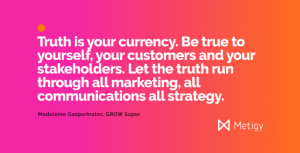
What’s the first thing you would do in rethinking your marketing strategy?
I’d do an audit on everything already in the pipeline. This isn’t business as usual. I’d make sure everything that goes out has a new lens on it.
I’d rethink what I’m offering, how I’m offering, and what I can offer to make it relevant and useful for this new age we’ve found ourselves in.
What if my business or industry has had to cease trading for now – what should my communication/marketing strategy be and/or should I just turn everything off?
It’s vital that you don’t lose touch with your audience otherwise you’ll be out of their minds when the situation corrects itself. There’s lots of easy content you can be sharing – content from the vault, asking them questions, throw-backs, profiles on your team, profiles on your customers and education pieces.
Mobile, social and digital has never been more important – if this isn’t their strong point, what are your suggestions to get the ball rolling?
What better time to get mobile, social and more digital than now! It can be a good opportunity to upskill yourself – look at taking an online course, work on creating a social media strategy and calendar. Maybe it’s time to get started with e-commerce. The web is a great (affordable) place to start – so look no further.
What content are people looking for at this time?
People are looking for any form of relief from the current pandemic news cycle. So if it’s in your brand voice to be light-hearted, it would be welcomed. Don’t shy away from being vulnerable – vulnerability creates connection. People are at home – a lot – so look at content that can occupy them – recipes, craft ideas, at-home-exercise, meditation, long-form articles. Spread some joy and distraction tools!
It’s a good time for a business health check. What’s the most important thing you recommend? (SEO, Google business listings, going deep with your data?)
I’m a big fan of getting deep with your data. Export everything and go through it with a finetooth comb – from your email database and campaign reports, to advertising results, to website traffic. It’ll give you lots of intel and a good to-do list to get on with.
Forget strategy for a second, how much should content at this point acknowledge COVID-19 and how much should comms be business as usual?
If you don’t need to address COVID-19 – as in, if it’s not affecting your customers – then I don’t think you need to weigh into the noise that’s going on. People are looking for relative normalcy so if you can offer that, all the better. Having said that, if you need to address changes in your business and for your customers, just be succinct, honest and transparent. Then get on with the task at hand.
If you only had $100 to spend on paid advertising, where would you put it?
I’d buy a bottle of wine, a takeaway pizza and then sit down and read up on how to get the best out of social and mobile advertising and spend any spare change on that.
Gabrielle Trang
MARKETING & COMMUNICATIONS
As a business, what’s the most important thing to keep focused on during this time?
With uncertainty purveying our daily news cycle, it’s important to work on giving back to the community by offering valuable content by way of useful information. Focusing on existing clients and how you can better serve them during this time whether it is executing on customer feedback or offering increased customer service avenues serves as a way to show gratitude for their ongoing business and a touchpoint moving forward when the economy recovers.
What’s the first thing you would do in rethinking your marketing strategy?
Gain some clarity on your marketing strategy mindset especially when your company is in a situation beyond its control:
- What are the overarching business objectives and what has changed?
As a startup, this can change more often because we have the ability to quickly alter or divert resources into another strategy and marketing can follow quickly. - Who is your ideal client/customer?
Rethinking and understanding this will feed into your entire business, products, sales and support. - What sets your business apart from others?
Market changes mean that customers are constantly comparing your offerings to another company’s offerings. Revisiting what it is about your product that makes it unique can give you some insight on what to do next.

- What is the data saying?
When in doubt what is my analytics telling me and what could I be doing differently?
What if my business or industry has had to cease trading for now – what should my communication/marketing strategy be and/or should I just turn everything off?
Keep communicating! Keep your employees, potential future employees, customers and stakeholders in mind and convey a positive and grateful outlook.
At the very least the comms/marketing should be an acknowledgement of the situation with an indication that this is not the end. Unless it is the certain end, your business objective is to return once this is possible and to do this you will need to communicate that you are only saying farewell for now while you hibernate.
At this point, the company is subject to external forces beyond your control but now would be a good time to hunker down and plot out a creative comeback considering your future potential resources, the environment and your competition.
Forget strategy for a second, how much should content at this point acknowledge COVID-19 and how much should comms be business as usual?
Definitely acknowledge it with a degree of sensitivity for every piece that goes out. Exploiting a situation does not tie into a holistic long term marketing strategy and objectives. Instead, think about how your comms can offer value by being helpful during this time in a way that is empathetic and genuine. At the same time don’t be afraid to push out content that has nothing to do with COVID-19. A break from the daily deluge of bad news can also be effective and work to your benefit as it ties in with your overall brand.
Geoff Main
FOUNDER AND HEAD OF MARKETING
Passionberry Marketing
As a business, what’s the most important thing to keep focused on during this time?
Helping and inspiring your fellow marketers and business owners. March 2020 will be remembered as one of the most challenging times for everyone who lived it. No one is immune to the frustration, stress and uncertainty that everyone is facing. With this in mind, I’ve gone on a worldwide search to find some of the great COVID-19 marketing campaigns to inspire all of us to find opportunities where they may exist or simply inspire communities to come together and help one another. Check them out here.
What if my business or industry has had to cease trading for now – what should my communication/marketing strategy be and/or should I just turn everything off?
The last time I was a marketer in a recession was the GFC and I was working in food categories. With more people unable to afford eating out, the opportunity came to tap into in-home needs of families to make ends meet. There’s always a new set of needs to be met that can create more income.
The Harvard Business Review have a great piece about marketing in a recession, highlighting that brands who increase advertising during a recession, when competitors are cutting back, can improve market share and return on investment at a lower cost than during good economic times.” It’s a great opportunity to get a stronger share of voice.
So what are the problems that consumers are facing?
- Lack of mobility?
- Loneliness?
- Job uncertainty?
- Breaking new social norms?
- Restricted budgets?
- How can you best solve this problem with your product or service?
For example, people are going to spend more time in their home. More people will look to renovate existing homes rather than move. During winter they will want to be warm, safe and healthy. Out of home expenditure will be transferred to in-home expenditure. Do you have services or products that help them to be warm, safe, healthy & comfortable in their own homes? But is this true?
What’s the first thing you would do in rethinking your marketing strategy?
Every community will be affected by the coronavirus. Focus on how you can best help customers, doing the right thing as a business and provide clear communication. You should think about a crisis as a time to enhance relationships with the local communities in which you operate by:
- Providing resources that help others such as cleaning supplies or food for those in quarantine, let staff work from home or by providing paid sick leave.
- Providing clarity about how key groups like staff and customers are being looked after by your business
- Providing information to the local media or via email and social media to showcase what you’re doing, how you’re helping and how others can contribute.
By being open and honest in your communications, you will get rewarded by your key audiences. When dealing with uncertainty, leaders need to look at communication from the perspective of your audience and have empathy for them rather than fear of doing the wrong thing.
Businesses never have all the information they need to answer everyone’s queries. So just be clear about what you’re doing, how you’re helping and be positive when answering questions.
Related: Building your first digital marketing campaign with Geoff Main from Passionberry Marketing
Louise Chen
FOUNDER AND HEAD OF MARKETING
As a business, what’s the most important thing to keep focused on during this time?
Businesses like Dyson, Ford and General Motors are building ventilators to accommodate for the shortage in hospitals. The makers of Absolut Vodka and Jameson Irish Whiskey are making and donating hand sanitiser.
Whilst it’s tempting to think about our own problems and how to help ourselves amidst a crisis, it’s what we do to help each other and serve others during times of crisis that matter most, will be remembered, and pay dividends in the future.
So, based on our customer feedback, we started a campaign to provide healthcare workers with free parking on our platform around hospitals.
Related: Share with Oscar are using Metigy to help healthworkers during COVID-19
We’ve had really heart-warming responses from our community – individuals and businesses alike, and overwhelming gratitude from healthcare workers who are so thankful to the community for their gestures. It’s clear that during times like this, people want to help, and do their part, and that by coming together as a community, its lifted community spirit.
Find out more: If you’re interested in finding out more about Share with Oscar, we interviewed them in episode 19 of the Forward Thinking Podcast.
Listen now: Building a community to drive your marketing with Lisa and Louise from Share with Oscar
How are you marketing during these uncertain times?

We hope you received some actionable advice from these marketing experts that you can take away and implement for immediate results during these uncertain times. We have found that it’s always best to learn from marketers that are actually on the front-line executing these different strategies in their own businesses. Which tips are you going to try first? What marketing activity has been getting results for your business during COVID-19? We would love to hear from you in the comments section below.
Related: The best COVID-19 marketing campaigns that will inspire your business


